- Home
- Frederick Marryat
Newton Forster
Newton Forster Read online
Produced by Ted Garvin, Celsus Clark, Elaine Wilson and PG DistributedProofreaders
NEWTON FORSTER OR, THE MERCHANT SERVICE
BY CAPTAIN MARRYAT
LONDON J.M. DENT AND CO. BOSTON: LITTLE, BROWN AND CO. MDCCCXCV 1832,1895
Contents
CHAPTER I
CHAPTER II
CHAPTER III
CHAPTER IV
CHAPTER V
CHAPTER VI
CHAPTER VII
CHAPTER VIII
CHAPTER IX
CHAPTER X
CHAPTER XI
CHAPTER XII
CHAPTER XIII
CHAPTER XIV
CHAPTER XV
CHAPTER XVI
CHAPTER XVII
CHAPTER XVIII
CHAPTER XIX
CHAPTER XX
CHAPTER XXI
CHAPTER XXII
CHAPTER XXIII
CHAPTER XXIV
CHAPTER XXV
CHAPTER XXVI
CHAPTER XXVII
CHAPTER XXVIII
CHAPTER XXIX
CHAPTER XXX
CHAPTER XXXI
CHAPTER XXXII
CHAPTER XXXIII
CHAPTER XXXIV
CHAPTER XXXV
CHAPTER XXXVI
CHAPTER XXXVII
CHAPTER XXXVIII
CHAPTER XXXIX
CHAPTER XL
CHAPTER XLI
CHAPTER XLII
CHAPTER XLIII
CHAPTER XLIV
CHAPTER XLV
CHAPTER XLVI
CHAPTER XLVII
CHAPTER XLVIII
CHAPTER XLIX
CHAPTER L
CHAPTER LI
CHAPTER LII
CHAPTER LIII
Prefatory Note
_Newton Forster, or the Merchant Service_, first appeared in the_Metropolitan Magazine_, 1832. It is one of the novels which speciallysuggests a comparison between Marryat and Smollett, both authors havingdescribed acts of impressment with vigour and indignation.
Jeffrey, of the _Edinburgh Review_, wrote to Mrs Marryat, January1832:----
"That I have read it [_Newton Forster_] all through in the week I haveto finish the preparation of our Scotch Reform Bill (if you will forgiveme for mentioning such a thing) is proof enough, I think, that myopinion is very favourable. It is certainly very entertaining, which Itake to be the first virtue of a work of this description; but it isinteresting as well as entertaining, and not only shows great power ofinvention, but a very amiable nature and a kind heart."
The _Editor_ quoted on page 23 is presumably Marryat himself. At leastthe footnote occurs in the first edition, and was probably reprintedfrom the magazine, where the identity of editor and author was not sopatent.
It is here printed from the first edition, in three volumes; motto:Honesty is the best policy. James Cochrane & Co., 1832.[1] R.B.J.[Footnote 1: Thompson has been changed to Johnson and, in another place,Robinson to Robertson, in order to let the same characters act under onename throughout the book.]
Newton Forster;
OR,
The Merchant Service
* * * * *
Chapter I
"And what is this new book the whole world makes such a rout about? ----Oh! 'tis out of all plumb, my lord,----quite an irregular thing; not one of the angles at the four corners was a right angle. I had my rule and compasses, my lord, in my pocket----Excellent critic!
"Grant me patience, just Heaven! Of all the cants which are canted in this canting world----though the cant of hypocrites may be the worst, the cant of criticism is the most tormenting!"----Sterne.
What authors in general may feel upon the subject I know not, but I havediscovered, since I so rashly took up my pen, that there are threeportions of a novel which are extremely difficult to arrange to thesatisfaction of a fastidious public.
The first is the beginning, the second the middle, and the third is theend.
The painter who, in times of yore, exposed his canvas to universalcriticism, and found, to his mortification, that there was not aparticle of his composition which had not been pronounced defective byone pseudo-critic or another, did not receive severer castigation than Ihave experienced from the _unsolicited_ remarks of "d----d good-naturedfriends."
"I like your first and second volume," said a tall, long-chinned,short-sighted blue, dressed in yellow, peering into my face, as if hereyes were magnifying glasses, and she was obtaining the true focus ofvision, "but you fall off in your last, which is all about that _nasty_line-of-battle ship."
"I don't like your plot, sir," bawls out in a stentorian voice anelderly gentleman; "I don't like your plot, sir," repeated he with anair of authority, which he had long assumed, from supposing becausepeople would not be at the trouble of contradicting his opinions, thatthey were incontrovertible--"there is nothing but death."
"Death, my dear sir," replied I, as if I was hailing the lookout man atthe mast-head, and hoping to soften him with my intentional bull; "isnot death, sir, a true picture of human life?"
"Ay, ay," growled he, either not hearing or not _taking_; "it's all verywell, but--there's too much killing in it."
"In a novel, sir, killing's no murder, you surely will admit; and youmust also allow something for professional feeling--''tis myoccupation;' and after five-and-twenty years of constant practice,whether I wield the sword or the pen, the force of habit----"
"It won't do, sir," interrupted he; "the public don't like it.Otherwise," continued this hypercritic, softening a little, "some of thechapters are amusing, and, on the whole, it may be said to berather--that is--not unpleasantly written."
"I like your first and third volume, but not your second," squeaked out_something_ intended to have been a woman, with shoulder-blades andcollar-bones, as De Ville would say, most strongly developed.
"Well now, I don't exactly agree with you, my dear Miss Peego; I thinkthe second and third volumes are by far the most _readable_" exclaimed_another thing_, perched upon a chair, with her feet dangling half waybetween her seat and the carpet.
"If I might presume upon my long standing in the service, Captain----,"said a pompous general officer, whose back appeared to have been_fished_ with the kitchen poker--"if I might venture to offer youadvice," continued he, leading me paternally by the arm a little on oneside, "it would be not again to attempt a defence of smuggling: Iconsider, sir, that as an officer in his Majesty's service, you havestrangely committed yourself."
"It is not my defence, sir: they are the arguments of a smuggler."
"You wrote the book, sir," replied he, sharply; "I can assure you that Ishould not be surprised if the Admiralty took notice of it."
"Indeed, sir!" replied I, with assumed alarm.
I received no answer, except a most significant nod of the head, as hewalked away.
But I have not yet arrived at the climax, which made me inclined toexclaim, with the expiring Lion in the fable----
A midshipman--yes, reader, a midshipman--who had formerly belonged to myship and had trembled at my frown, ranged up alongside of me, and, witha supercilious air, observed--
"I have read your book, and--there are _one_ or _two_ good things init."
Hear this, admirals and captains on half-pay! hear this, port-admiralsand captains afloat! I have often heard that the service wasdeteriorating, going to the devil, but I never became a convert to theopinion before.
Gracious Heaven! what a revengeful feeling is there in the exclamation"O that mine adversary had _written a book_!" To be snarled at, andbow-wowed at, in this manner, by those who find fault because theirintellect is not sufficient to enable them to appreciate! Authors, takemy resolution;
which is, never to show your face until your work haspassed through the ordeal of the Reviews--keep your room for the monthafter your literary labour. Reviews are like Jesuit fatherconfessors--guiding the opinions of the multitude, who blindly followthe suggestions of those to whom they may have entrusted their literaryconsciences. If your work is denounced and to be released at once fromyour sufferings by one blow from the paw of a tiger, than to be worriedpiecemeal by creatures who have all the will, but not the power, toinflict the _coup de grace_?
The author of "Cloudesley," enumerating the qualifications necessary toa writer of fiction, observes, "When he introduces his ideal personageto the public, he enters upon his task with a preconception of thequalities that belong to this being, the principle of his actions, andits necessary concomitants, &c, &c." That such preparation ought to bemade, I will not deny; but were I to attempt an adherence to theserules, the public would never be troubled with any production of mine.It would be too tedious a journey in perspective for my waywardintellect; and if I calculated stages before I ordered my horses, Ishould abandon the attempt, and remain quietly at home. Mine is not ajourney of that methodical description; on the contrary, it is a ramblehand-in-hand with Fancy, with a light heart and a lighter baggage; formy whole wallet, when I set off, contains but one single idea--but ideasare hermaphrodite, and these creatures of the brain are most prolific.To speak more intelligibly, I never have made any arrangement of plotwhen I commenced a work of fiction, and often finish a chapter withouthaving the slightest idea of what materials the ensuing one is to beconstructed. At times I feel so tired that I throw down the pen indespair; but t is soon taken up again, and, like a pigmy Ant, itseems to have imbibed fresh vigour from its prostration.
I remember when the "King's Own" was finished, I was as happy as apedestrian who had accomplished his thousand miles in a thousand hours.My voluntary slavery was over, and I was emancipated. Where was I then?I recollect; within two days' sail of the Lizard, returning home, aftera six weeks' cruise to discover a rock in the Atlantic, which neverexisted except in the terrified or intoxicated noddle of some master ofa merchant vessel.
It was about half-past five in the evening, and I was alone in myafter-cabin, quite alone, as the captain of a man-of-war must be, evenwhen in presence of his ship's company. If being sent to sea has beenpronounced by the officers and men to be _transportation_, being thecaptain of the ship may truly be designated as _solitary confinement_.
I could not send for any one to whom I could impart theintelligence--there was no one whom I could expect to sympathise withme, or to whom I could pour out the abundance of my joy; for that theservice prohibited. What could I do? Why, I could dance; so I sprangfrom my chair, and singing the tune, commenced a quadrillemovement,--Tal de ral la, tal de ral la, lity, lity, lity, liddle-um,tal de ral la, tal--
"Three bells, sir," cried the first lieutenant, who had opened my doorunperceived by me, and showed evident surprise at my motions; "shall webeat to quarters?"--
"Certainly, Mr B--," replied I, and he disappeared.
But this interruption produced only a temporary cessation: I was in theheight of "Cavalier seul," when his head popped into the cabin--
"All present, and sober, sir," reported he, with a demure smile.
"Except the captain, I presume you are thinking," replied I.
"Oh! no, indeed, sir; I observed that you were very merry."
"I am, Mr B--, but not with wine; mine is a sort of intellectualintoxication not provided for in the Articles of War."
"A what! sir?"
"Oh! something that you'll never get drunk upon, as you never look intoa book--beat a retreat."
"Ay, ay, sir," replied the first lieutenant; and he disappeared.
And I also beat a retreat to my sofa; and as I threw myself upon it,mentally vowed that, for two months at the least, I never would take upa pen. But we seldom make a vow which we do not eventually break; andthe reason is obvious. We vow only when hurried into excesses; we arealarmed at the dominion which has been acquired over us by our feelings,or by our habits. Checked for a time by an adherence to our resolutions,they gradually recover their former strength, until they again breakforth, and we yield to their overpowering influence. A few days after Ihad made the resolution, I found myself, like the sailor, _rewarding_ itby writing more indefatigably than ever.
So now, reader, you may understand that I continue to write, as TonyLumpkin says, not to please my good-natured friends, "but because Ican't bear to disappoint myself;" for that which I commenced as anamusement, and continued as a drudgery, has ended in becoming a_confirmed habit_.
So much for the overture. Now let us draw up the curtain, and our actorsshall appear upon the stage.

 The Children of the New Forest
The Children of the New Forest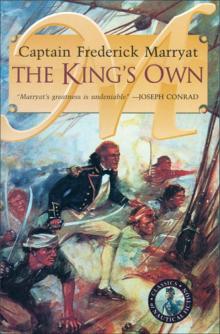 The King's Own
The King's Own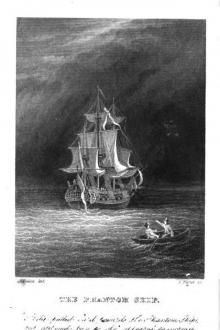 The Phantom Ship
The Phantom Ship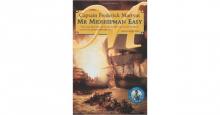 Mr. Midshipman Easy
Mr. Midshipman Easy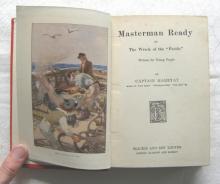 Masterman Ready; Or, The Wreck of the Pacific
Masterman Ready; Or, The Wreck of the Pacific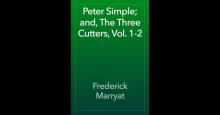 Peter Simple; and, The Three Cutters, Vol. 1-2
Peter Simple; and, The Three Cutters, Vol. 1-2 Travels and Adventures of Monsieur Violet
Travels and Adventures of Monsieur Violet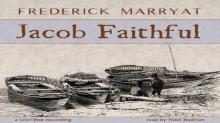 Jacob Faithful
Jacob Faithful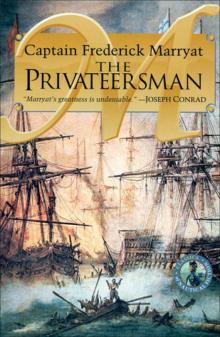 The Privateersman
The Privateersman Newton Forster
Newton Forster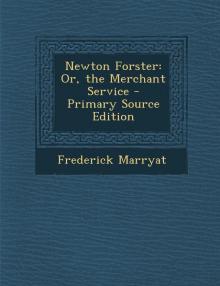 Newton Forster; Or, The Merchant Service
Newton Forster; Or, The Merchant Service The Pacha of Many Tales
The Pacha of Many Tales The Privateer's-Man, One hundred Years Ago
The Privateer's-Man, One hundred Years Ago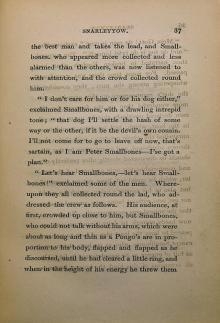 Snarleyyow, or, the Dog Fiend
Snarleyyow, or, the Dog Fiend Percival Keene
Percival Keene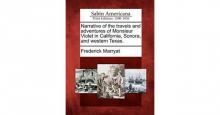 The Travels and Adventures of Monsieur Violet in California, Sonora, and Western Texas
The Travels and Adventures of Monsieur Violet in California, Sonora, and Western Texas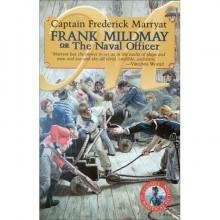 Frank Mildmay; Or, the Naval Officer
Frank Mildmay; Or, the Naval Officer The Mission
The Mission